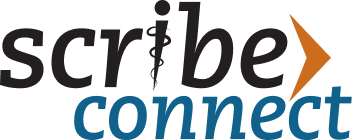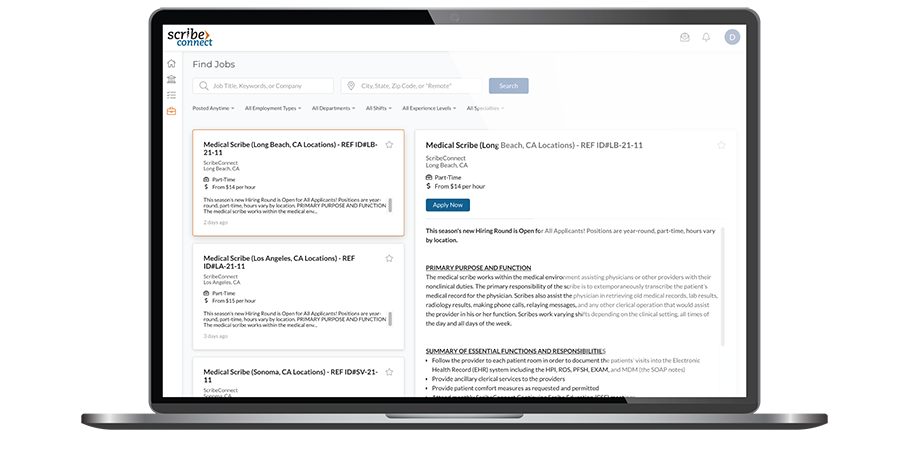Medical scribes are a part of the healthcare community, and all of us at ScribeConnect understand the heart to care for and serve others.
Especially as medical scribes, we also know the important role technology has played in advancing how healthcare is delivered. We were grateful and excited to hear about how one of our scribes took his passion for using technology to help others outside of the workplace to volunteer in Texas during Hurricane Harvey. Here is our interview with Sean Taxter, a scribe at UCLA Medical Center in Santa Monica, California.
SC: What made you want to go to Texas to help with Hurricane Harvey relief?
Sean: Social media actually had a big role in it… Go figure, social media as a positive influence for a change! Once I heard about how serious Harvey was quickly becoming, I searched articles online and found the Cajun Navy Facebook page, a group of private citizens on the Gulf Coast that volunteer their own time and boats to doing water search and rescue during floods and hurricanes. The organization uses a smartphone app called Zello to coordinate large rescue teams and anyone could download it and listen in. Local police/fire/coast guard were completely overwhelmed at the time and had no way of helping everyone in need, and it was extremely inspiring to hear these selfless people risking their lives to work in coordination with state agencies to help rescue as many people as possible.
Hearing the Zello emergency dispatch calls was when it really hit home for me: people hysterically calling in real time, saying the water is rising quickly, begging for someone to come rescue them as they were going to drown in their own homes with their family and children surrounding them. Parents were putting life jackets on their small children and prepared to push them off their roof into flood waters, in hopes that rescue teams would save them if the rest of the family wasn’t able to make it. It was completely gut-wrenching and unlike anything I’d ever experienced before. I realized I had the freedom and means at the time to give tangible help, and getting out there ASAP seemed like the best way to do that.
SC: What specifically did you do when you went to Texas?
Sean: I originally coordinated over the Cajun Navy page to meet someone with an extra spot in their boat heading down to Houston in need of a hand, but getting out there was a real challenge: the Houston and Beaumont airports were closed, and the nearest open airport was Austin. I got there four days after the storm had passed through, and by that time there was a surplus of boats and floodwater was receding so rescues were no longer an urgent need. I ended up going southwest of Houston to the coastal towns of Port Aransas and Rockport where Harvey first made landfall. They were getting less news coverage than Houston and had been hit even harder in terms of storm surge and wind damage.
Most of the weekend consisted of going door to door to houses that had been flooded and partially destroyed, asking residents if they needed help tearing up carpet, moving large furniture and appliances, or anything of value that could be salvaged, into the front yard. Most houses had six inches of standing water on the floor and mold already growing 3-4 feet up the walls, and many were uninhabitable and had to be completely demolished in the following weeks.
SC: Besides the organization you found on Facebook, how else did you take the initiative to make this trip happen?
Sean: I had a few contacts in other parts of Texas that had headed down to volunteer earlier in the week, but it quickly became clear that finding and meeting up with them would be too difficult. I searched online for relief organizations in the area and signed up with a couple, but the day before my flight they emailed me saying that they couldn’t accept more volunteers at the time because they were overwhelmed and didn’t have the logistics or support for more people. So I just hopped on a red-eye flight, slept in the Austin airport for a few hours, and met some ex-military guys driving down to help who had an extra seat in their car.
SC: What was most impactful about your trip?
Sean: Two things. First, the destruction from a hurricane of this magnitude can’t be captured in words, photos, or on TV. Living in Southern California my entire life, I’d never seen anything like this. It was shocking: countless homes reduced to piles of broken wood and drywall, a liquor store with shelves intact but roof and walls gone, wooden docks completely stripped off their base, large trees uprooted, benches pulled out of concrete. There were hundreds of power line poles flattened, with seaweed 15-20 feet high on intact lines where storm surges had covered. I saw disgusting amounts of mold starting to grow in every building left standing, and more potentially disease-carrying mosquitos than I’ve ever seen. Abandoned pets seeking shelters, owners searching for pets and not knowing if they’ll ever see them again. Residents still in shock, sleeping in tents on their front lawn because they didn’t have anywhere else to go and refused to leave everything they own, looking for anything salvageable in the rubble before bulldozers come in to flatten their property.

Secondly, the human spirit. The love and compassion we have for each other is stronger than any storm or disaster. Seeing the resilience of these people that had nearly everything taken from them, and thousands of volunteers from around the country – many with no connection to the area – sacrificing their time, money and well-being to help was incredibly inspiring and something I’ll never forget. I was given a 5-hour car ride to the coast and back by a complete stranger. There was a volunteer base camp in Port Aransas that we met up at every morning. Two local guys started it as soon as the storm passed through and it grew until they had a caravan of at least a dozen campers and motorhomes, with local business donating food and people cooking around the clock for anyone who was hungry, no questions asked. A lot of people had jobs or other places they needed to be but put life on hold to help. I believe the volunteer camp was operational for almost two months until they recently shut it down because it the town had water and power restored, and it was no longer necessary.
SC: Any specific stories you would want to share about your trip that really moved you?
Sean: We went door-to-door and helped a woman who was elderly and unable to move anything herself. Her husband had recently been in a motorcycle accident and was in a wheelchair so he was unable to deal with the cleanup either. She had a trailer-style home on a raised wooden platform, but the foundation had been severely damaged, half of her roof had been ripped off, and her entire house was littered with pieces of drywall and fiberglass insulation. The only thing she cared about was old photos of her children and family she had in storage boxes, and she was in tears when we carried them out though a lot of them were water-logged and ruined. It was a heart-breaking reminder that for how much importance we as a society put into having a nice house, car and possessions, but what matters most is your health and the people, relationships, and memories you have. She was so appreciative that she offered to give the volunteers any item in her house they wanted. Nobody wanted to take anything from her, but it was abundantly clear how much it meant to her to have us there, and we were happy to help in any way we could.
SC: Anything else you want to share with us about your experience?
Sean: In our time of 24-hour news cycle and short attention spans, the aftermath is no longer getting any national news coverage. But that doesn’t mean that these people are all of a sudden OK. Tens of thousands of people in Southern Texas and Louisiana will be suffering for months and years to come from this storm. Many lost every worldly possession they own, many are elderly people living alone, many didn’t even have disaster insurance. Please consider donating your time or money to ongoing relief for Hurricances Harvey/Irma/Maria if you feel compelled to do so.
#HurricaneHarvey #HurricaneIrma #HurricaneMaria #CajunNavy #medicalscribes #servingothers #tomorrowsdoctors
Find out more about Cajun Navy Relief & Rescue
Follow ScribeConnect on Facebook
Read more ScribeConnect News
 In-House Scribe SolutionsTake control of your medical scribe program
In-House Scribe SolutionsTake control of your medical scribe program Contracted Full-Service Scribe SolutionsWe Build a Turn-Key Scribe Program For Your Organization
Contracted Full-Service Scribe SolutionsWe Build a Turn-Key Scribe Program For Your Organization In-House Scribe SolutionsTake control of your medical scribe program
In-House Scribe SolutionsTake control of your medical scribe program In-house Scribe Program OverviewWith the ScribeConnect Scribe Management Platform you can have the best part of medical scribe’s EHR documentation help right in your organization.
In-house Scribe Program OverviewWith the ScribeConnect Scribe Management Platform you can have the best part of medical scribe’s EHR documentation help right in your organization. Overview and Key featuresMedical scribe management doesn’t have to be difficult, no matter what every other scribe providers tell you. The only SaaS medical scribe management platform is here for you.
Overview and Key featuresMedical scribe management doesn’t have to be difficult, no matter what every other scribe providers tell you. The only SaaS medical scribe management platform is here for you.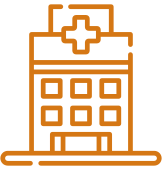 for Healthcare OrganizationsFrom large hospital systems across urban centers, to small clinics operating in rural areas, our platform is designed to scale, grown, and accommodate your medical scribing needs.
for Healthcare OrganizationsFrom large hospital systems across urban centers, to small clinics operating in rural areas, our platform is designed to scale, grown, and accommodate your medical scribing needs. for Education InstitutesLooking for ways to offer your pre-med and pre-PA students more value? Or have a scribe training curriculum already in place and looking for a wider medical student audience? We can help.
for Education InstitutesLooking for ways to offer your pre-med and pre-PA students more value? Or have a scribe training curriculum already in place and looking for a wider medical student audience? We can help. for Scribe ApplicantsApply to medical scribe job openings across the country, and join a community of thousands of medical scribes. Access our comprehensive scribe training courses and more!
for Scribe ApplicantsApply to medical scribe job openings across the country, and join a community of thousands of medical scribes. Access our comprehensive scribe training courses and more!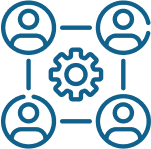 How to use our PlatformOur platform is simple to use, with robust features and powerful tools. Learn how to get the most out of our SaaS based platform with tips and tricks.
How to use our PlatformOur platform is simple to use, with robust features and powerful tools. Learn how to get the most out of our SaaS based platform with tips and tricks. Contracted Full-Service Scribe SolutionsWe Build a Turn-Key Scribe Program For Your Organization
Contracted Full-Service Scribe SolutionsWe Build a Turn-Key Scribe Program For Your Organization Full-Service Scribe Program OverviewWe hire, train, and manage your medical scribes so you don't have to.
Full-Service Scribe Program OverviewWe hire, train, and manage your medical scribes so you don't have to. Any provider, any time, anywhere.ScribeConnect has provided full-service, turn-key medical scribe programs for healthcare organizations large and small.
Any provider, any time, anywhere.ScribeConnect has provided full-service, turn-key medical scribe programs for healthcare organizations large and small.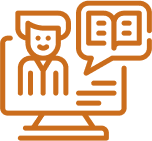 Frequently Asked QuestionsHere are some frequently asked questions that may help you decide whether or not a medical scribe program is right for you.
Frequently Asked QuestionsHere are some frequently asked questions that may help you decide whether or not a medical scribe program is right for you. Healthcare OrganizationsOur platform empowers your organization with intuitive tools to recruit, track applicants, train & certify scribes, and manage teams. Build and grow a strong and dynamic scribe program of any size with confidence.
Healthcare OrganizationsOur platform empowers your organization with intuitive tools to recruit, track applicants, train & certify scribes, and manage teams. Build and grow a strong and dynamic scribe program of any size with confidence. Healthcare OrganizationsOur platform empowers your organization with intuitive tools to recruit, track applicants, train & certify scribes, and manage teams. Build and grow a strong and dynamic scribe program of any size with confidence.
Healthcare OrganizationsOur platform empowers your organization with intuitive tools to recruit, track applicants, train & certify scribes, and manage teams. Build and grow a strong and dynamic scribe program of any size with confidence.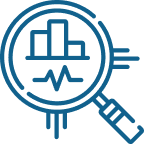 Solutions For Your Healthcare OrganizationEase your documentation load, keep your providers happy, and improve your revenue cycle with ScribeConnect Medical Scribe Solutions. Designed for Healthcare Networks, Clinics, Hospitals, Emergency Departments, and Practice Management Groups
Solutions For Your Healthcare OrganizationEase your documentation load, keep your providers happy, and improve your revenue cycle with ScribeConnect Medical Scribe Solutions. Designed for Healthcare Networks, Clinics, Hospitals, Emergency Departments, and Practice Management Groups Post A Job & Track ApplicantsWhether you're hiring one scribe, or an entire team or teams of scribes, we have America's largest dedicated medical scribe job board. Post, manage, and HIRE the most qualified scribes.
Post A Job & Track ApplicantsWhether you're hiring one scribe, or an entire team or teams of scribes, we have America's largest dedicated medical scribe job board. Post, manage, and HIRE the most qualified scribes. Course CatalogOur industry-leading, academically-based, professional Medical Scribe Training Courses (MSTCs) are designed for a range of topics, from general and continuing scribe training to in-depth specialty-specific courses.
Course CatalogOur industry-leading, academically-based, professional Medical Scribe Training Courses (MSTCs) are designed for a range of topics, from general and continuing scribe training to in-depth specialty-specific courses. Educational InstitutionsFrom enrollment to alumni services, ScribeConnect’s platform can be your powerhouse medical scribe training and certification program.
Educational InstitutionsFrom enrollment to alumni services, ScribeConnect’s platform can be your powerhouse medical scribe training and certification program. Educational InstitutionsFrom enrollment to alumni services, ScribeConnect’s platform can be your powerhouse medical scribe training and certification program.
Educational InstitutionsFrom enrollment to alumni services, ScribeConnect’s platform can be your powerhouse medical scribe training and certification program. Academic PartnershipsSee what a partnership with ScribeConnect can do for your department and institution.
Academic PartnershipsSee what a partnership with ScribeConnect can do for your department and institution. Learn About Our Collegiate CoursesLearn about our academically-rigorous certificate courses that have been developed for the college student and how they can complement & expand your program's offerings.
Learn About Our Collegiate CoursesLearn about our academically-rigorous certificate courses that have been developed for the college student and how they can complement & expand your program's offerings.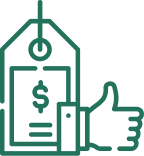 Financial Partnership ProgramSee how our financial partnership program can provide your institution with a new income stream in an extremely fast-growing, emerging, and competitive industry.
Financial Partnership ProgramSee how our financial partnership program can provide your institution with a new income stream in an extremely fast-growing, emerging, and competitive industry. ScribesAspiring scribes begin their education and path to employment here, while experienced scribes can learn valuable new skills and specialty-specific knowledge to take it to the next level.
ScribesAspiring scribes begin their education and path to employment here, while experienced scribes can learn valuable new skills and specialty-specific knowledge to take it to the next level. ScribesAspiring scribes begin their education and path to employment here, while experienced scribes can learn valuable new skills and specialty-specific knowledge to take it to the next level.
ScribesAspiring scribes begin their education and path to employment here, while experienced scribes can learn valuable new skills and specialty-specific knowledge to take it to the next level.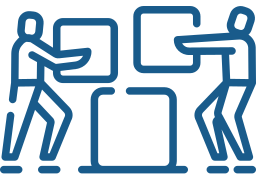 What We Can Do For YOU?ScribeConnect has built a rich legacy of helping pre-medical professionals launch their careers. Now we're providing more powerful tools than ever before to help you win. See how.
What We Can Do For YOU?ScribeConnect has built a rich legacy of helping pre-medical professionals launch their careers. Now we're providing more powerful tools than ever before to help you win. See how. Find JobsSearch our job board and apply to jobs in your area. Apply to work directly with ScribeConnect at one of our locations or apply directly to one of our partners.
Find JobsSearch our job board and apply to jobs in your area. Apply to work directly with ScribeConnect at one of our locations or apply directly to one of our partners. Course CatalogPosition yourself above the competition when you get certified through our rigorous Medical Scribe Training Courses (MSTCs). You'll be prepared and equipped to work as a scribe in the medical setting of your choice.
Course CatalogPosition yourself above the competition when you get certified through our rigorous Medical Scribe Training Courses (MSTCs). You'll be prepared and equipped to work as a scribe in the medical setting of your choice.